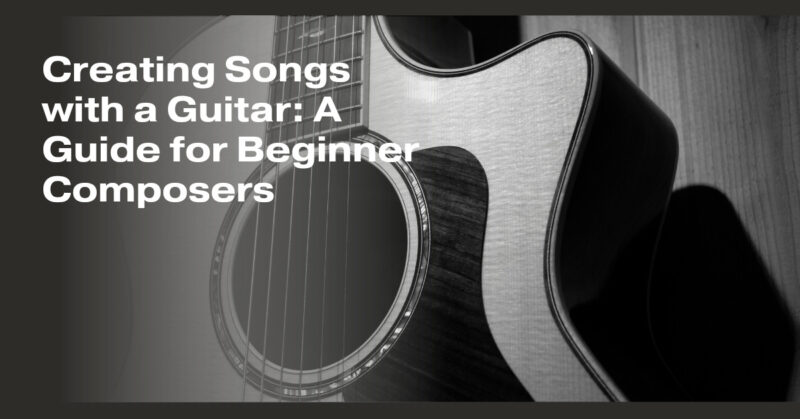Creating songs with a guitar can be a rewarding and creative endeavor, even for beginner composers. Whether you’re writing lyrics, crafting melodies, or experimenting with chord progressions, here’s a step-by-step guide to help you get started on your songwriting journey:
1. Learn Basic Guitar Chords:
- As a beginner, start by learning a few basic guitar chords, such as C, G, D, A, and E major, as well as their corresponding minor chords. These will form the foundation of your songwriting.
2. Practice Strumming Patterns:
- Develop your strumming skills by practicing various strumming patterns. Experiment with downstrokes, upstrokes, and combinations to create rhythmic variations.
3. Understand Song Structure:
- Familiarize yourself with common song structures, such as verse-chorus-verse-chorus-bridge-chorus. This structure provides a framework for organizing your song’s components.
4. Create a Chord Progression:
- Start by crafting a chord progression that serves as the backbone of your song. Experiment with different sequences of chords to find a pleasing and unique progression.
5. Write Lyrics:
- Begin writing lyrics that fit the mood and theme of your song. Lyrics can be inspired by personal experiences, stories, or emotions. Try to tell a compelling story or convey a strong message.
6. Melody Creation:
- Develop a melody to accompany your lyrics. You can do this by singing along while playing your chord progression or experimenting with single-note melodies on the guitar.
7. Experiment with Songwriting Tools:
- Explore songwriting tools like a rhyming dictionary or a thesaurus to enhance your lyric writing and find suitable rhymes and word choices.
8. Record Your Ideas:
- Use a simple recording device or software to capture your songwriting ideas. This allows you to remember and refine your compositions.
9. Add Dynamics:
- Create dynamics in your song by varying the intensity and volume of your playing. For instance, strumming softly during verses and strumming vigorously during choruses can add contrast.
10. Bridge and Pre-Chorus: – Incorporate a bridge or pre-chorus section to introduce variation and build anticipation within your song.
11. Experiment with Songwriting Prompts: – Use songwriting prompts or themes to spark creativity and challenge yourself to write outside your comfort zone.
12. Seek Feedback: – Share your songwriting with friends, family, or fellow musicians to gather constructive feedback and suggestions for improvement.
13. Revise and Refine: – Don’t be afraid to revise and refine your song. Songwriting is an iterative process, and your initial draft may evolve into something even better.
14. Perform and Record: – Once you’re satisfied with your song, practice performing it regularly. Consider recording a demo or sharing your song on platforms like SoundCloud or YouTube to get feedback from a wider audience.
15. Embrace Inspiration: – Keep a notebook or digital journal to jot down song ideas, lyrics, and melodies as they come to you. Inspiration can strike at any moment.
16. Study Songwriting: – Study the songs of your favorite artists and analyze their songwriting techniques. Learning from established songwriters can provide valuable insights into composition.
17. Be Patient and Persistent: – Songwriting is a skill that improves with practice. Be patient with yourself and keep writing regularly to develop your songwriting abilities.
Remember that songwriting is a creative process, and there are no strict rules. Your unique perspective and experiences can result in songs that are truly one-of-a-kind. So, keep experimenting, learning, and expressing yourself through your guitar and lyrics, and you’ll continue to grow as a songwriter.


